‘Vera Stark’ aims a satiric lens at Hollywood stereotype of black film characters in 1930s
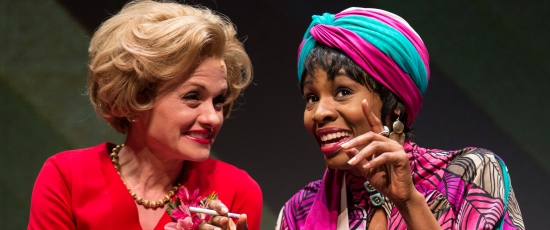 “By the Way, Meet Vera Stark” by Lynn Nottage, at Goodman Theatre through June 2 ★★
“By the Way, Meet Vera Stark” by Lynn Nottage, at Goodman Theatre through June 2 ★★
By Lawrence B. Johnson
Satire, social commentary and shaggy dog story, Lynn Nottage’s 2011 play “By the Way, Meet Vera Stark” draws a clear bead on those first two objectives only to end up meandering through the third. It’s half an entertaining, provocative evening at the Goodman Theatre, half a test of patience.
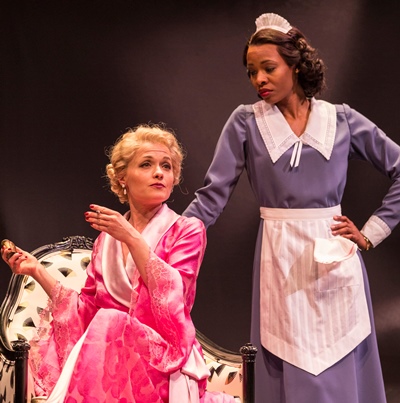 Vera Stark, by the way, is a fictional African American actress in 1930s Hollywood, a time and place when black actors were stereotyped as maids or in degrading caricatures – or both. Witness the whole aggregation of slaves, including Hattie McDaniel’s Oscar-winning portrayal as Mammy in “Gone With the Wind” (1939). Nottage’s play starts from the proposition that only by stealing scenes in small roles could a black actor get noticed in those racially circumscribed days.
Vera Stark, by the way, is a fictional African American actress in 1930s Hollywood, a time and place when black actors were stereotyped as maids or in degrading caricatures – or both. Witness the whole aggregation of slaves, including Hattie McDaniel’s Oscar-winning portrayal as Mammy in “Gone With the Wind” (1939). Nottage’s play starts from the proposition that only by stealing scenes in small roles could a black actor get noticed in those racially circumscribed days.
At the play’s outset, Vera (the radiant and funny Tamberla Perry) really is a maid, a highly literate one who does double duty as personal caretaker and script reader for star-spangled, alcohol-enhanced actress Gloria Mitchell, done to a long-suffering T by Kara Zediker. Vera gets her shot at a film role when director Maximillian Von Oster (Ron Rains) decides his new project must have “authentic” black servants – meaning stereotypes who appear illiterate and oafish.
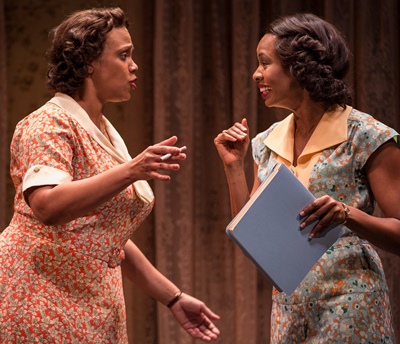 Whereupon Vera and her pal Lottie (TaRon Patton), on hand to help Vera at a party for the director and producer, switch into Obsequious Slave mode, down to their shuffle and pidgin English. Perry and Patton are like a stand-up duo producing salvos of riotous comedy as the two maids one-up each other in their efforts to show the director “authenticity.”
Whereupon Vera and her pal Lottie (TaRon Patton), on hand to help Vera at a party for the director and producer, switch into Obsequious Slave mode, down to their shuffle and pidgin English. Perry and Patton are like a stand-up duo producing salvos of riotous comedy as the two maids one-up each other in their efforts to show the director “authenticity.”
That word is layered with irony here. This, after all, is Hollywood, where no one is exactly who, or what, they appear to be. Another of Vera’s girlfriends, and like Lottie also her roommate, shows up at the party on the director’s arm. Meet slinky, gorgeous Anna Mae Simpkins (Amelia Workman), passing herself off as a Brazilian – complete with accent. The director can’t take his eyes off her. Neither can Vera or Lottie. It’s all they can do not to blow their friend’s cheeky cover.
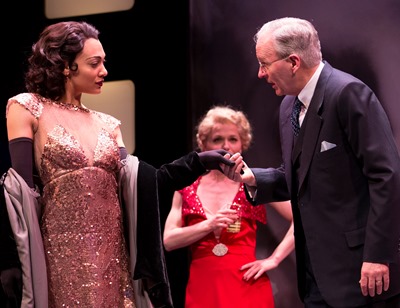 What we really have going here, through this first act, is a sharp, brisk sitcom. The second act is essentially a different play. It is seven actors in search of meaning.
What we really have going here, through this first act, is a sharp, brisk sitcom. The second act is essentially a different play. It is seven actors in search of meaning.
We have left ‘30s Hollywood behind. It’s 2003, and we’re on the set of a panel discussion where two female black studies scholars — post-modern in everything from their gender-neutral attire to their analytical babble — are holding forth on the iconic import of Vera Stark. Look closely. Our bookish disputants are the sexy faux-Brazilian and faux-maid of Act I, Amelia Workman and TaRon Patton. They offer an amusing send-up of self-important academics.
 This overwrought historical assessment is preceded by several minutes of actual film, the final scene of the movie Vera, Lottie and star Gloria went on to make back in 1933. As the scholarly deconstruction progresses stage right, the host (Chiké Johnson) occasionally cuts away to a “video clip”– played live at center stage — of Vera Stark’s last public appearance, on a talk show back in 1973. There Vera reminisces about that film and the ambiguity of its famous last scene, in which she (as the maid) and Gloria (as a dying Southern belle) seemed to project a subversive double meaning to the woman’s farewell to life and the pledge of both for a brighter tomorrow.
This overwrought historical assessment is preceded by several minutes of actual film, the final scene of the movie Vera, Lottie and star Gloria went on to make back in 1933. As the scholarly deconstruction progresses stage right, the host (Chiké Johnson) occasionally cuts away to a “video clip”– played live at center stage — of Vera Stark’s last public appearance, on a talk show back in 1973. There Vera reminisces about that film and the ambiguity of its famous last scene, in which she (as the maid) and Gloria (as a dying Southern belle) seemed to project a subversive double meaning to the woman’s farewell to life and the pledge of both for a brighter tomorrow.
It’s this whole second act that needs to be deconstructed. The rant by the two scholars, each confident that she alone has the true perspective on events that transpired decades before they were born, is mildly funny for the first few minutes. Then redundancy sets in. You could feel the air go out of the theater. Is this stuff meant to be serious? Does even the playwright know? Nothing this dull could be edgy.
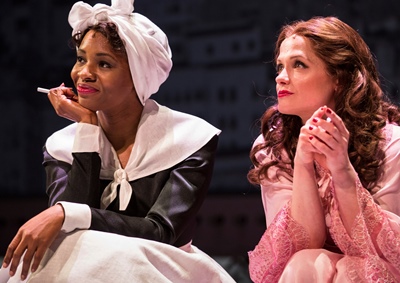 The interpolated television clips don’t work any better. The host (Patrick Clear) is about as interesting as paste. Hanging around is another show guest, British rocker Peter Rhys-Davies (Ron Rains), a sort of Tiny Tim character who occasionally plucks his ukulele and mutters a word or two. The recap of Vera’s film story is deadly beyond words. Been there, saw that.
The interpolated television clips don’t work any better. The host (Patrick Clear) is about as interesting as paste. Hanging around is another show guest, British rocker Peter Rhys-Davies (Ron Rains), a sort of Tiny Tim character who occasionally plucks his ukulele and mutters a word or two. The recap of Vera’s film story is deadly beyond words. Been there, saw that.
What is good, in fact fabulous, is a brief film clip — again, actual film — of a trumpet player and composer (Chiké Johnson) whom Vera meets in Act I. Back then, he was a handsome, charming young man with serious aspirations, and they ended up getting married. But fate has dealt the trumpet player a bad hand, and their marriage has collapsed. The clip is an interview with the musician in middle age, and it is dramatically incandescent: In a close-up, this weathered, now reticent man talks in plain, earnest terms about Vera, the amazing woman he loved. It’s an enthralling few minutes, beautifully acted.
“By the Way, Meet Vera Stark,” directed by Chuck Smith with fetching costumes — both period and funky — by Birgit Rattenborg Wise, is an agreeable comedy that loses its compass and gets tangled in its message. In its comedic guise, Lynn Nottage’s theme is compelling; but when she abandons her core story and its prickly textured satire, the whole enterprise implodes.
Related Links:
- Performance location, dates and times: Details at TheatreinChicago.com
- Preview of Goodman Theatre’s complete 2012-13 season: Details at ChicagoOntheAisle.com
Tags: Amelia Workman, Birgit Rattenborg Wise, By the Way Meet Vera Stark, Chiké Johnson, Chuck Smith, Goodman Theatre, Kara Zediker, Lynn Nottage, Patrick Clear, Ron Rains, Tamberla Perry, TaRon Patton

